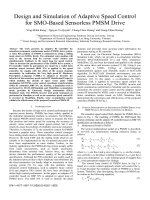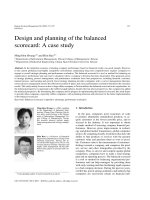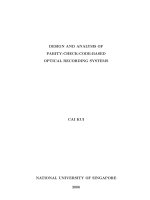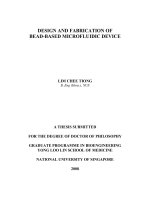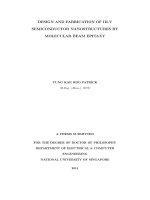Darwin, Design, and Divine Providence
Bạn đang xem bản rút gọn của tài liệu. Xem và tải ngay bản đầy đủ của tài liệu tại đây (91.94 KB, 17 trang )
P1: JRT/IRK P2: JZP
0521829496Agg.xml CY335B/Dembski 0 521 82949 6 March 10, 2004 22:7
12
Darwin, Design, and Divine Providence
John F. Haught
To the theist, a central question after Darwin is whether evolution renders
implausible the notion of divine Providence. Do the rough and ragged fea-
tures of the new story of life place in question the idea of a personal God
who cares for the world? Most theologians today would say no, but the more
intimately the idea of Providence is tied to that of “intelligent design,” the
more difficult becomes the task of reconciling theology with evolutionary
biology. I suspect that much of the energy underlying so-called Intelligent
Design (ID) theory, in spite of explicit denials by some of its advocates, is
an achingly religious need to protect the classical theistic belief in divine
Providence from potential ruination by ideas associated with Darwinian sci-
ence. It is impossible not to notice that the advocates of IDT are themselves
almost always devout Christian, Muslim, and occasionally Jewish theists. It is
difficult, therefore, for most scientists and theologians to accept the claim
that no theological agenda is at work in the ID movement.
It is highly significant, moreover, that scientific proponents of ID, al-
though often themselves experts in mathematics and specific areas of sci-
ence, are generally hostile to evolutionary theory (Behe 1996; Dembski,
1998, 1999; Johnson, 1991, 1995). The justification they usually give for re-
jecting what most scientists take as central to biology is that Darwinism, or
neo-Darwinism, is simply a naturalist belief system and not science at all.
Evolution, they claim, is so permeated with materialist metaphysics that it
does not qualify as legitimate science in the first place ( Johnson 1991, 1999).
This protest is indicative of a religious sensitivity that recognizes materialism
to be inherently incompatible with theism.
Although, as I shall illustrate more extensively, it is clearly the case that
contemporary presentations of evolution are often interlaced with a heavy
dose of materialist ideology, it is not likely that a concern for science’s
methodological purity is the driving force behind ID’s energetic protests
against Darwinism. Rather, I would suggest, the flight from Darwin is rooted
quite simply in an anxiety that his evolutionary ideas may be incompatible
229
P1: JRT/IRK P2: JZP
0521829496Agg.xml CY335B/Dembski 0 521 82949 6 March 10, 2004 22:7
230
John F. Haught
with any coherent notion of God or divine Providence. And the suspicion
that Darwinism conflicts with the doctrine of Providence is ultimately rooted
in the ID judgment that Darwinism, if true, would render the notion of intel-
ligent design unbelievable. Hence the way to defend Providence – by which
I mean here the “general” doctrine that God cares or “provides” for the uni-
verse – is to defend design.
1
Quite candidly, it seems to me that beneath all
of the complex logical and mathematical argumentation generated by the
ID movement there lies a deeply human and passionately religious concern
about whether the universe resides in the bosom of a loving, caring God or
is instead perched over an abyss of ultimate meaninglessness.
What may add some credibility to the ID preoccupations, rendering them
less specious than they might at first seem, is the fact that many evolution-
ary biologists (and philosophers of biology) agree that Darwin’s “dangerous
idea” does indeed destroy the classical argument from design and that in
so doing it exorcizes from scientifically enlightened consciousness the last
remaining traces of cosmic teleology and supernaturalism. Since religion,
as the renowned American philosopher W. T. Stace pointed out long ago,
stands or falls with the question of cosmic purpose (Stace 1948, 54), the
Darwinian debunking of design – and with it the apparent undoing of cosmic
teleology as well – strikes right at the heart of the most prized religious intu-
itions of humans, now and always. Darwinism seems to many Darwinians –
and not just to IDT advocates such as Phillip Johnson, Michael Behe, and
William Dembski – to entail a materialist and even anti-theistic philosophy
of nature. Michael Ruse even refers to Darwinism as “the apotheosis of a ma-
terialist theory” (Ruse 2001, 77). Consequently, it seems to many theists as
well as to many scientists that we must choose between Darwinism and divine
Providence.
A straightforward example of this either/or thinking is Gary Cziko’s book
Without Miracles (1995), a work that from beginning to end explicitly places
“providential” in opposition to “selectionist” explanations for all the vari-
ous features of life. For Cziko, as for many other Darwinians, there isn’t
enough room in the same human mind to hold both scientific and theolog-
ical explanations simultaneously, so we must choose one over the other. In
her discussion of sociobiology, Ullica Segerstr˚ale (2000, 399–400) insight-
fully comments that Richard Dawkins likewise assumes that in accounting
for living phenomena there can be only one “explanatory slot.” And so, if
Darwinism now completely fills that single aperture, there can be no room
for any theological explanation to exist alongside it.
In my own reading of contemporary works on evolution, I have observed
time and again a tacitly monocausal or univalent logic (laced with curt ap-
peals to Occam’s razor) that inevitably puts biological and providential ar-
guments into a competitive relationship. To give just one of many possible
examples, in Darwin’s Spectre, Michael R. Rose illustrates the widespread be-
lief that accounting for life must be the job either of theology or of Darwinism,
P1: JRT/IRK P2: JZP
0521829496Agg.xml CY335B/Dembski 0 521 82949 6 March 10, 2004 22:7
Darwin, Design, and Divine Providence
231
but not of both. “Without Darwinism,” he claims, “biological science would
need one or more deities to explain the marvelous contrivances of life.
Physics and chemistry are not enough. And so without Darwinism science
would remain theistic, in whole or in part” (Rose 1998, 211). Clearly, the
assumption here is that evolutionary science has now assumed occupancy
of the same explanatory alcove that was formerly the dwelling place of the
gods. And now that Darwin has expelled the deities from this niche, there
is no longer any plausible explanatory place left for religion or theology.
Historically, it is true, religious ideas have often played a quasi-scientific
or prescientific explanatory role, even while also providing ultimate expla-
nations. But science has now – providentially, we may say – liberated the-
ology from the work of satisfying the more mundane forms of inquiry. Yet
even today, scriptural literalists want religious ideas to fill explanatory spaces
that have been assigned more appropriately to science. Not everyone em-
braces the distinction that mainstream Western theology has made between
scientific and theological levels of explanation. Cziko’s and Rose’s books,
along with the better-known works of Richard Dawkins (1986, 1995, 1996),
Daniel Dennett (1995), and E. O. Wilson (1998), demonstrate that today’s
biblical literalists are not alone in assuming that religious and theological
readings of the world lie at essentially the same explanatory level as natural
science.
Only this assumption could have led to the forced option between Provi-
dence, on the one hand, and natural selection, on the other. Thus, for many
evolutionists there is no legitimate cognitive role left for religion or theol-
ogy after Darwin, only (at best) an emotive or evaluative one. For them, as
Rose’s book lushly exemplifies, Darwinism goes best with materialism (Rose
1998, 211). It is not entirely surprising, then, that religiously sensitive souls
would balk at evolution if they were persuaded by the words of evolution-
ists themselves that Darwinism is indeed inseparable from “materialism”–
a philosophy that is logically irreconcilable not only with intelligent design
but also with each and every religious interpretation of reality.
If the appeal by biologists to “materialism” were simply methodological,
then the ID community would have no cause for complaint. By its very na-
ture, science is obliged to leave out any appeal to the supernatural, and so its
explanations will always sound naturalistic and purely physicalist. In many
cases, I believe that ID advocates unnecessarily mistake methodological nat-
uralism/materialism for metaphysical explanation. Alvin Plantinga (1997)
even argues that there can be no sharp distinction between methodological
and metaphysical naturalism. Practicing the latter, he thinks, is a slippery
slope to the former. But even aside from Plantinga’s questionable proposal,
the ID intuition that Darwinians often illegitimately conflate science with
materialist ideology is completely accurate. The problem is that, like their
Darwinian opponents, ID theorists typically accept the assumption that only
one “explanatory slot” is available and that if we fill it up completely with
P1: JRT/IRK P2: JZP
0521829496Agg.xml CY335B/Dembski 0 521 82949 6 March 10, 2004 22:7
232
John F. Haught
naturalistic explanations, there will be no room left anywhere for theological
explanations.
Consequently, if the contemporary discussion of the question of
Darwinism and design is ever going to penetrate beneath surface accusa-
tions, it must consider two questions. First, is Darwinian biology unintelligi-
ble apart from a philosophical commitment to materialism – a philosophy
of nature that theists everywhere and of all stripes will take to be inher-
ently atheistic? That is, does the information gathered by the various sci-
ences tributary to evolutionary theory (geology, paleontology, comparative
anatomy, radiometric dating, biogeography, genetics, etc.) remain unintel-
ligible unless it is contextualized within a materialist philosophy of nature?
And, second, would the elimination of the notion of “intelligent design”
in scientific explanations of life’s organized complexity logically entail the
downfall of a credible doctrine of divine Providence, as both ID theorists and
their evolutionary antagonists generally seem to agree would be the case? In
the interest of fairness, we owe the IDT advocates a careful consideration of
their suspicion that Darwinism is materialist atheism in disguise. But for the
sake of giving a fair hearing to the full spectrum of theological reflection
after Darwin, we should also look at the question of just how vital the notion
of “intelligent design” is to a religiously robust notion of Providence. I will
now consider each of these two questions in turn.
I.
is darwinism inherently materialistic?
It is not without interest to our inquiry that in the intellectual world today,
critics of theism are increasingly turning for support to Charles Darwin.
Many skeptics who seek to ground their suspicions about the existence of
God in science no longer look as fervently to Freud, Marx, Nietzsche, Sartre,
or Derrida as they do to Darwin. Especially for those already convinced that
science is essentially ruinous to religion, Darwin has become more appeal-
ing than ever. His portrait of nature’s apparent indifference seems to of-
fer more compelling reasons than ever for scientific atheism. In fact, for
some critics today natural selection provides much more secure grounds
for atheism than do the impersonal laws of physics, which had already ren-
dered the idea of divine action apparently superfluous several centuries ago.
Even the renowned physicist Steven Weinberg considers Darwinism to be a
much more potent challenge to theism than his own discipline (Weinberg
1992, 246). He singles out the ID enthusiast Phillip Johnson as the most
sophisticated example of a theological alternative to Darwin and then pro-
ceeds to shred theism by destroying the arguments of one who, at least to
Weinberg, speaks most eloquently for belief in God after Darwin (247–8).
For many others among the scientific elite today, the ways of evolution are so
coarse that even if the universe appears on the surface to be an expression
of design, beneath this deceptive veneer there lurks a long and tortuous
P1: JRT/IRK P2: JZP
0521829496Agg.xml CY335B/Dembski 0 521 82949 6 March 10, 2004 22:7
Darwin, Design, and Divine Providence
233
process in which an intelligent Deity could not conceivably have played any
role.
It is not only the waste, struggle, suffering, and indifference of the evolu-
tionary process that place in question the idea of a benevolent providential
Deity. The three main evolutionary ingredients – randomness, the imper-
sonal law of selection, and the immensity of cosmic time – seem to be enough
to account causally for all the phenomena we associate with life, including
design. The apparent completeness of the evolutionary recipe makes us
wonder whether the universe requires any additional explanatory elements,
including the creativity of a truly “interested” God. We may easily wonder,
then, whether we can reconcile the ragged new picture of life not only with
the idea of an intelligent Designer but also with any broader notion of divine
Providence. Darwin himself, reflecting on the randomness, pain, and im-
personality of evolution, abandoned the idea that nature could have been
ordered in its particulars by a designing Deity. It is doubtful that he ever
completely renounced the idea of God, since he often seems to have settled
for a very distant divine law maker. But he gradually became convinced that
the design in living beings could be accounted for in a purely naturalistic
way. After Darwin, many others, including a number of the most promi-
nent neo-Darwinian biologists writing today, have come close to equating
Darwin’s science with atheism. Sensitive to the conflation of Darwin’s sci-
ence with philosophical materialism that prominent biologists often make,
ID proponents have drawn the conclusion that Darwinian biology, as evi-
denced in the publications of Darwinians themselves, is simply incapable of
being reconciled with theistic belief. In order to save theism, then, Darwin
must be directly refuted.
Not only scientific skeptics but also other intellectuals are now making
the figurative pilgrimage to Down House in order to nourish their mate-
rialist leanings. A good example is the noted critic Frederick Crews, who
recently published a titillating two-part essay, “Saving God from Darwin,” in
The New York Review of Books (October 4 and 18, 2001). Crews is best known
for his constant pummelling of Sigmund Freud, whose ideas he considers
blatantly unscientific. But in all of his blasting of psychoanalysis he has never
challenged Freud’s materialist metaphysics. Crews clearly shares with Freud
the unshakable belief that beneath life, consciousness, and culture there
lies ultimately only mindless and meaningless material stuff.
In Crews’s opinion, Darwin has uncovered the ultimate truth to which all
intelligent and courageous humans must now resign themselves. Referring
to Daniel Dennett’s radically materialist interpretation of Darwin, Crews is
convinced that Dennett has “trenchantly shown” that Darwin’s ideas lead
logically to “a satisfyingly materialistic reduction of mind and soul” and
that evolutionary theory entails a “naturalistic account of life’s beginning”
(Crews, October 4, p. 24). Even though the materialism and naturalism he
is referring to are really examples of metaphysics and not pure science, for
P1: JRT/IRK P2: JZP
0521829496Agg.xml CY335B/Dembski 0 521 82949 6 March 10, 2004 22:7
234
John F. Haught
Crews they have become part and parcel of biology itself. Crews, of course,
is not a biologist, but he could easily point to many ideological associates
in the scientific community who share his view that the ultimate “truth” of
Darwinism is a materialist and Godless cosmos.
This, of course, is exactly the same not-so-subtle message that proponents
of ID have detected in contemporary evolutionary thought. Crews upbraids
the ID literature for sneaking theology into an explanatory slot that sci-
ence alone should inhabit. But interestingly, his own comprehension of
Darwinism – a conflation of science with materialist metaphysics – is iden-
tical to that of his ID opponents. In both instances, the idea of evolution
is understood to be inseparable from the nonscientific belief that matter is
all there is and that the universe is inherently pointless – an assumption
that is inherently antithetical to theism of any kind. For Crews, as well as
for numerous biologists and philosophers today, evolution and materialism
come as a package deal (see also Dennett 1995). And so the only difference
between them and ID disciples is that the latter throw the package away,
whereas the former hold onto it tightly. Both evolutionary materialists and
ID advocates discern at the bottom of Darwinism a fundamentally pointless
universe.
We may have good reason to wonder, then, whether the evolutionist alloy
of scientific information and philosophically materialist belief is any closer
to pure science than the conflation of biology with Intelligent Design that
is now the object of so much scientific scorn. If ID is advised to keep the-
ological explanation (under the guise of an abstract notion of “Intelligent
Design”) from intruding into biology, are not Darwinians also obliged to
keep whatever philosophical biases they may have from invading their pub-
lic presentations of evolutionary science?
Strictly speaking, after all, it is no more appropriate to say that Darwinism
is a materialist theory than it is to say that the theory of relativity is. All
science must be methodologically materialist – in the sense that it is not
permissible when doing science to invoke nonphysical causes. It is one thing
to hold that evolutionary science provides a picture of nature that supports
a purely materialist philosophy of life, if you happen to have one. But it is
quite another to claim – as Rose, Cziko, Dawkins, Dennett, and many others
do – that the facts of evolution do not make sense outside of a materialist
philosophical landscape. How would we ever know for sure that this is the
case? Such a claim is based as much on belief as on research, and it is one
that will forever remain logically unsupportable by scientific evidence as
such. Moreover, there is always the possibility that alternative metaphysical
frameworks may turn out to be no less illuminating settings for interpreting
evolutionary information (Haught 2000).
For now, however, it is sufficient to note that, strictly speaking, nei-
ther Darwinians nor their ID adversaries can logically claim that evolution-
ary biology is an expression of materialism. Like all other applications of



